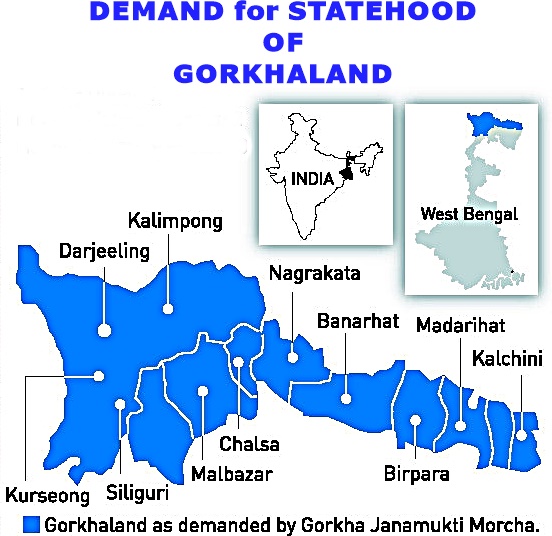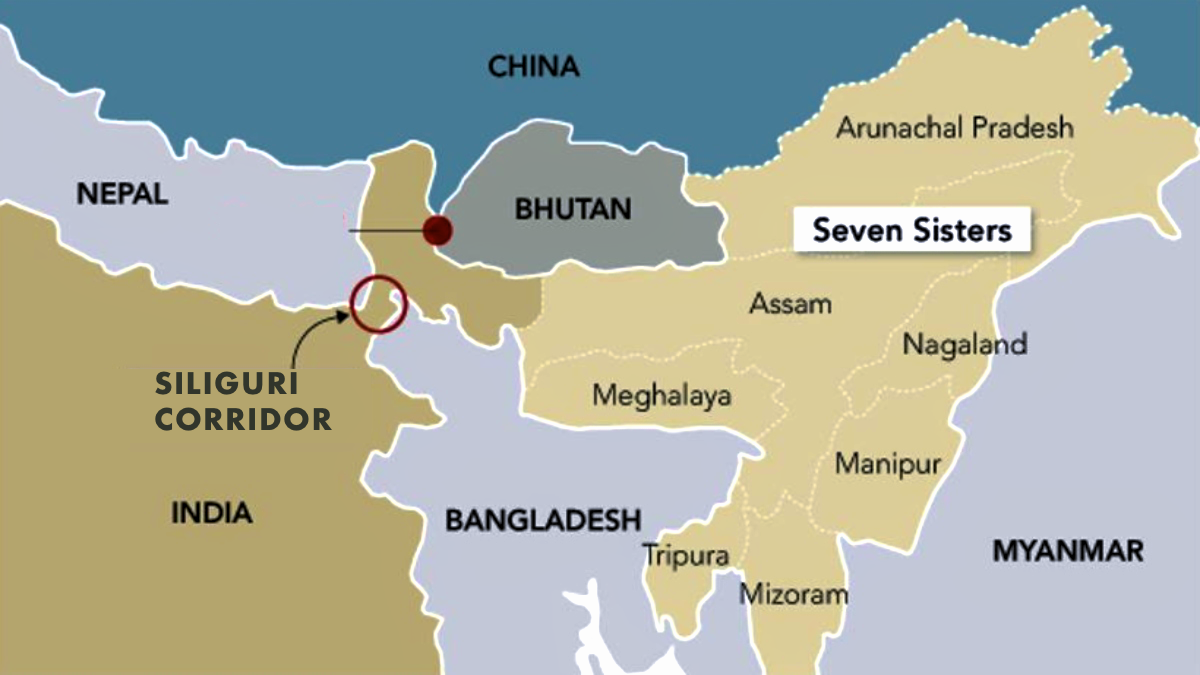



Copyright infringement not intended
Picture Courtesy: thefederal
Pankaj Kumar Singh, former Deputy National Security Adviser, was appointed by the Union Government to lead talks with Gorkha representatives from Darjeeling, Terai, and Dooars to find a "permanent political solution" to their demands, including Gorkhaland statehood.
Gorkhaland is the name of a proposed state within India, demanded by the Nepali-speaking Gorkha people in the northern region of West Bengal.
The demand includes the hill districts of Darjeeling and Kalimpong, as well as parts of the Dooars and Terai regions.
 What are the historical roots of the Gorkhaland demand?
What are the historical roots of the Gorkhaland demand?
Who are the Gorkhas?
The Gorkhas are a martial community originating from Nepal, globally renowned for their bravery.
They are Indian citizens of Nepali ethnic descent, whose distinct cultural and linguistic identity forms the core of the statehood demand.
Gorkha regiments have been part of the Indian Army since 1815.
Distinct Colonial Administration
Under British rule, the Darjeeling region was never fully integrated with the Bengal province and was administered as a separate unit. This sowed the seeds of a distinct political identity.
First Formal Demand (1907)
In 1907, the first formal demand for a separate administrative body was made to the Morley-Minto Reforms Committee, citing cultural and linguistic differences from the Bengal plains.
Post-Independence Agitations
The movement gained significant momentum in the 1980s under the Gorkha National Liberation Front (GNLF), led by Subhas Ghising.
The demand was revived in the 2000s by the Gorkha Janmukti Morcha (GJM) under Bimal Gurung.
Constitutional Recognition of Language
In 1992, the Nepali language was included in the Eighth Schedule of the Constitution; recognizing the linguistic identity of the Gorkha people.
Autonomous Councils: Instead of creating a state, the government has twice established semi-autonomous councils:
Appointment of Interlocutors
The Central Government has periodically appointed interlocutors to facilitate dialogue. The most recent is the appointment of former Deputy NSA Pankaj Kumar Singh in october 2025.
Tripartite Talks
The government facilitates talks between the Centre, the West Bengal government, and Gorkha representatives.
Preservation of Cultural Identity
A separate state would protect and promote the unique Nepali-speaking Gorkha culture, which they feel is marginalised in the Bengali-majority state.
Focused Governance and Development
A smaller, local state government would be better equipped to address the specific needs of the hill region (tourism, tea, horticulture) and reverse decades of alleged economic neglect and revenue drain by Kolkata.
Political Empowerment and Self-Governance
Statehood would provide genuine political autonomy and a stronger voice in policy-making, overcoming the community's numerical insignificance in the large West Bengal assembly.
Economic Non-Viability
Critics question whether a state heavily dependent on the seasonal and fluctuating sectors of tea and tourism could be economically self-sustaining. It would depend heavily on central government grants.
National Security Threat
The Darjeeling region is located in the strategically vital and sensitive "Siliguri Corridor" (or "Chicken's Neck"), which connects mainland India to northeastern states.
A new, small, and financial unstable state bordering Nepal and Bhutan could be vulnerable to exploitation by hostile external forces.

The "Pandora's Box" Effect
Creating Gorkhaland could trigger a cascade of similar statehood demands across India (e.g., Bodoland, Vidarbha, Bundelkhand), leading to widespread administrative disruption and political instability.
Territorial Integrity of West Bengal
The West Bengal government has consistently and strongly opposed the bifurcation of the state.
Sincere and Sustained Dialogue
The process initiated by the new interlocutor must be a sincere, time-bound, and transparent tripartite dialogue involving the Centre, the West Bengal Government, and all factions of Gorkha leadership.
Enhanced Autonomy (Strengthened GTA)
Addressing the ST Status Demand
Granting Scheduled Tribe (ST) status to Gurkha sub-communities is a non-statehood solution that would provide social and economic benefits, addressing a key aspect of marginalization.
Comprehensive All-Party Dialogue
The dialogue must involve all stakeholders: the Gurkha political parties (GJM, GNLF), the West Bengal State Government, and the Central Government.
Security and Development Alignment
A dedicated, centrally-monitored economic package is needed to develop infrastructure, promote high-value tourism and organic farming, and establish institutions for higher education (like a Central University) to create local opportunities.
The Gorkhaland issue, a federalism test, requires a balanced solution. Full statehood is difficult, but the movement cannot be ignored. An empowered autonomous council with "statehood-like" powers, ST status, and targeted development is crucial. Stakeholders must compromise for a pragmatic solution that fulfills Gorkha identity and ensures national integrity.
Source: THEHINDU
|
PRACTICE QUESTION Q. The demand for Gorkhaland highlights a conflict between ethno-linguistic identity and constitutional federalism. Critically analyze. 250 words |
Gorkhaland is a proposed state that would be carved out of the northern parts of West Bengal. The demand is for the creation of a separate administrative unit for the Nepali-speaking Gorkha ethnic community residing in the Darjeeling hills, Kalimpong, Kurseong, and the Dooars region.
The Gorkha community feels ethnically, culturally, and linguistically distinct from the majority Bengali population of West Bengal. The demand is fueled by a desire to preserve their unique identity and address issues of underdevelopment, perceived neglect, and a sense of political alienation.
The demand for Gorkhaland continues to be a persistent political issue. Recent developments have included calls for unity among hill parties and the appointment of an interlocutor by the central government to initiate dialogue with representatives of the Gorkha community.
© 2026 iasgyan. All right reserved